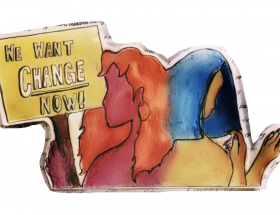It can feel awkward trying to justify emotions using scientific evidence. Yet we know of the profound effects break ups have on our mental and physical health. We see it happen to those surrounding us, and we’ve likely experienced it ourselves. Unlike most changes, which occur gradually, a breakup is a swift, powerful blow which knocks its recipient off balance. From the abundance of unanswered questions and speculations about break ups and whether to get back together, here are a few theories and studies which will hopefully help you gain some insight.
Firstly – why do break ups make us feel pain, almost as though it was inflicted physically? In short, it’s because rejection activates the same somatosensory regions of the brain as the experience of pain. This was studied through a small-scale social rejection experiment published in the Proceedings of the National Academy of Science, which studied the brains of 40 volunteers, who, in the last 6 months, were romantically rejected. The volunteers were given a photo of their ex-partner to look at and were instructed to focus on a positive memory of them. Meanwhile, their brain activity was studied through fMRI scans. Those scans were compared to fMRI scans of people experiencing physical pain. The results showed the same regions of the brain lit up. Therefore, social rejection activates the same sensory regions of the brain as the experience of physical pain.
Helen E. Fisher looks at relationships from a different perspective; that of an anthropologist. She believes that romantic love should be seen as an addiction. In fact, drugs such as cocaine and romantic love activate the same pathways in the brain – our reward systems. Fisher argues it was evolutionary process that increased our chance of survival 4 million years ago. Love activates the release of dopamine and oxytocin, and those “happy hormones” encourage us to bond with a partner and reproduce. It is worth mentioning that love, unlike cocaine, is an addiction with a positive association (and without all the negative side effects).
So, if we believe romantic love is an addiction, how would that explain behaviour after break ups? Like any drugs, if one abstains from taking their regular dose, they’ll experience withdrawal symptoms. Some commonly seen are insomnia/hypersomnia, lack of appetite/binge eating, crying, irritability, lethargy. Fisher’s study suggests we treat romantic rejection the same way we would, drug withdrawal: replace the romantic attachment with other relationships, such as forging close bonds with friends and family. It’s also beneficial to partake in physical exercise to regulate dopamine pathways and hence mood. Finally, get rid of memorabilia – messages, photos, clothing items of the ex-partner. Memorabilia only induces craving of what was; so, think about cleansing your Instagram profile of your ex’s presence.
Now, onto a dramatic and widely speculated topic: can you die from a broken heart? A quick google search will inform you that broken heart syndrome, AKA stress-induced cardiomyopathy is a real thing. It is a weakening of the left ventricle, that presents with chest pain and shortness of breath. It’s almost indistinguishable from a heart attack; in hospitals, it is treated as such. Can you die from it? In very rare cases, it may be fatal. However, in most cases it is treatable and temporary. Furthermore, it’s important to note that broken heart syndrome was (first) studied in women between the ages of 58 and 75 during the 1990s in Japan. These were cases where women experienced a huge surge of stress hormones due to losing their life partners. So as much as getting ghosted hurts, just know it’s unlikely you’ll get broken heart syndrome from it. Interesting trivia: broken heart syndrome affects women almost exclusively.
A hormone found in abundance in our bodies after a break-up is cortisol. Cortisol is a stress-response hormone with a multitude of effects on our health. Having a stress response is both normal and protective. Small quantities of cortisol help us maintain optimal functioning in our daily life. Short-term surges of cortisol help us deal with situations that are an immediate threat to us. Unfortunately, with breakups, our production of cortisol is neither in small quantities nor short-lived. The constant presence of elevated cortisol takes its toll on our bodies. We are frozen in our fight or flight panic mode, due to the drastic change that has occurred in our lives. Apart from the predictable sleep and appetite changes, there are several other effects. For example, after a breakup, you are at an increased risk of mental health issues, such as depression. For those suffering from IBS, you may experience more severe or more frequent episodes, since cortisol decreases the blood supply to your digestive system. Cortisol is also a powerful immunosuppressant. In fact, doctors give medicine mimicking cortisol when immunosuppressive action is needed, for example for arthritis or after an organ transplant. But in everyday life, it means your immune system can’t fight off common pathogens as effectively, so you’re more likely to be affected by them. To top it all off, after a break-up, you are a 23% higher chance of developing acne.
On another note, a break-up is not necessarily permanent. Relationship cycling is the process of a relationship experiencing at least one break-up and reunion. Those emotional rollercoasters are also called boomerang, or on-off relationships. They’re commonly met – studies estimate that over one-third of current couples and one-fifth of current spouses are in such a relationship. Relationship cycling is not without its implications; for example, an on-off couple will likely experience greater limitations in permanently ending their relationship. Surveys also indicate such couples are likely to experience greater uncertainty in their partner and their future, resulting in having lower relationship satisfaction. Relationship cycling is a learned behaviour – someone who has been involved in a boomerang relationship is more likely to get involved in another one in the future.
Recurring break-ups and reconciliations correlate positively with higher levels of psychological distress. It is a predictable, albeit unfortunate, finding. Think about the unreliability of the ever-oscillating dynamics of a boomerang relationship. The constant uncertainty triggers our long-term stress response and cortisol is (yet again), produced. In one study conducted by the University of Missouri, 545 individuals and their relationships were studied. Kale Monk, an assistant professor of human development and family science, led the study. He noted that relationship cycling was associated with increased symptoms of depression and anxiety. This was the case regardless of whether the relationship was same- or different-sex.
Why do couples, after deciding to end their relationship, get back together? Popular reasons guiding reconciliation were presented at the 2008 International Association for Relationship Research in Providence, based on a survey of 274 participants. The most popular motive for getting back together was, unsurprisingly, experiencing lingering feelings towards an ex-partner. Continuing to love an ex, even when you’re no longer together, is a powerful motive behind attempting the relationship again. Other factors include a lack of dating others post-break up, or believing a break-up would improve the nature of the relationship (i.e. any previous relationship problems would be solved by the temporary break).
There is no universal recipe on what to do following a break-up. You may decide it is the permanent end of that relationship and move on; others may decide to give it another go. It is a personal choice, and one which shouldn’t be judged. We act based on individual beliefs on what will make us happier long-term. For those who decide it’s time to move on, it’s worth remembering there is no panacea for curing a break-up. Everyone grieves, in their own ways, for the “what could have been, but wasn’t”.
Art by Jennifer Van Der Merwe





I am going threw a break up and need advice on how to get over it and what can make me feel better and get my mind off of them.